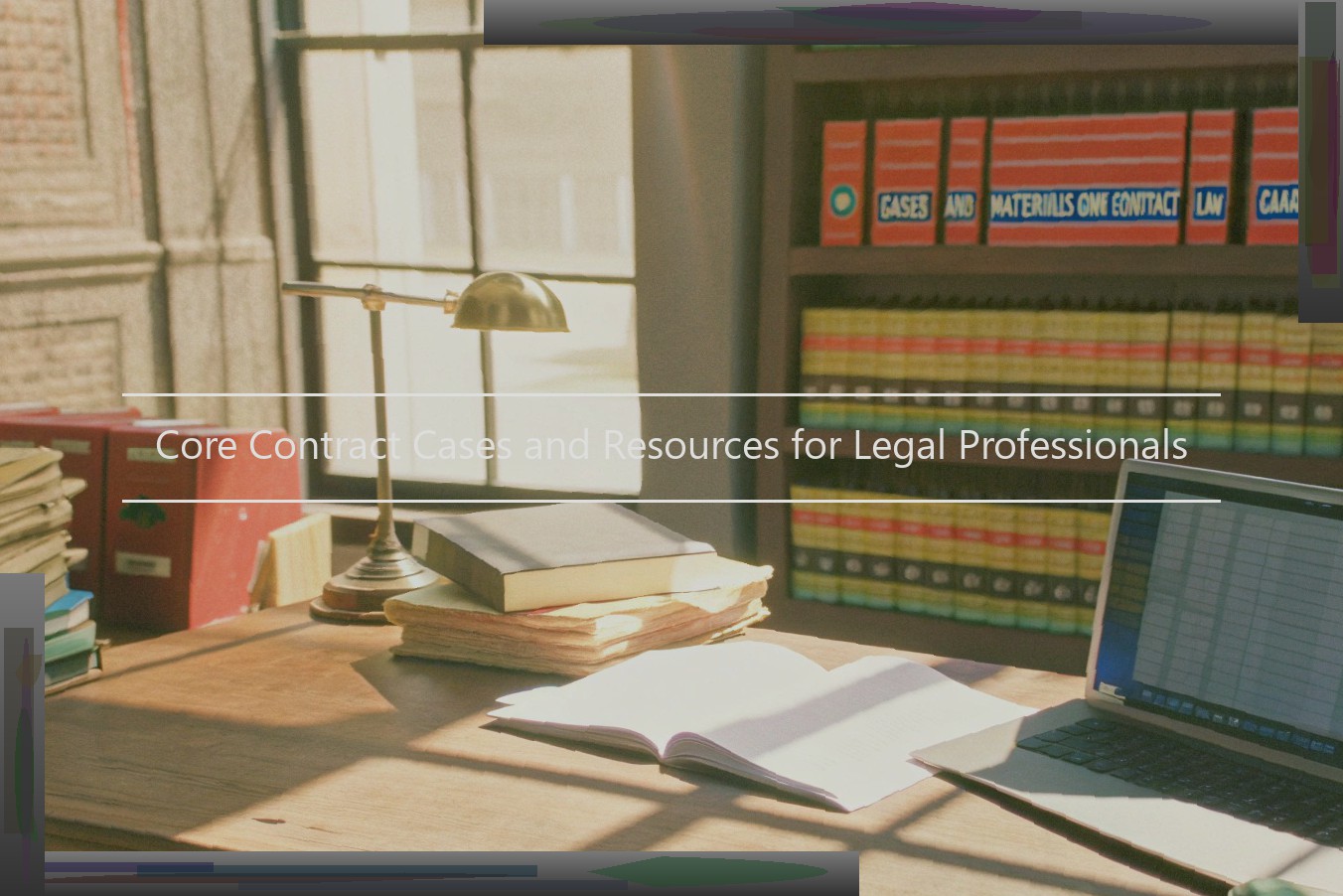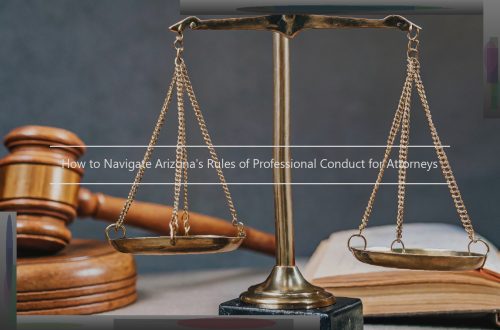Core Contract Cases and Resources for Legal Professionals
Principles and Rules of Contracts in Case Law
It’s safe to say that you can’t really master contract law without becoming intimately familiar with a multitude of key cases. There are, of course, literally thousands of contract law cases that have been handed down since the days of the old Common Law, but there are a few key cases that are amongst the most widely studied and frequently referenced.
For example, the contract law case of Curtis v. Chemical Processing Co., decided by the New Mexico Supreme Court in 1971, involved a breach of an employment contract. The Plaintiff, who had been employed by the Defendant for 13 years, was terminated seven days after he reported that several chemicals were being released from the facility without a permit. The Supreme Court concluded that a reasonable jury could have found retaliation and intentional infliction of emotional harm based on the Plaintiff’s evidence.
There is a long list of other important contract law cases that law students and practitioners are familiar with – Freidman v. Quest International, Inc., for instance, held that a breach of contract claim based on promissory estoppel cannot be sustained if there was consideration for the promise. Other popular contract law cases include Frostifresh Corp. v. Reynoso, which dealt with an implied covenant of good faith and fair dealing, and Tully v. Grief Companies, Inc., which involved unilateral mistake.
Outside of these standard examples, contract law also encompasses a large body of related materials, including:
Another major area of contract law is that relating to warranties . UCC Article II, which covers the sale of goods, lays out a variety of rules regarding contracts from merchants and implied warranties. For example, UCC 2-314 defines the commercial warranty – it states that the warranty only exists if the seller is a merchant of that good or similar goods. The warranty is also assumed if the good is fit for the purpose for which the good was sold.
UCC 2-315 establishes what is referred to as the "seller’s knowledge" provision. This section states that the seller is obligated to ensure that a product is fit for its intended purpose. Therefore, the buyer need only make known the purpose of the good to the seller in order for the latter to be held accountable for any defects in that good.
If the good is defective, then the buyer is entitled to some or all of the costs associated with the defect. There are a number of types of damages that the buyer may be able to recover in these cases. They can recover the difference between the value of what was owed under the contract and what was actually received, the full amount owed under the contract, the amount of consequential or special damages, loss of profts, the price paid under the contract, and any incidental damages that could be reasonably predictable.
It’s vitally important for a new attorney, especially one looking to specialize in contract law, to have a general understanding of these issues.

Best Casebooks, Supplements, and Aids for the Study of Contracts
The following are often recommended for law students and practitioners to have in their library:
- USA – Cases and Materials
- USA – Cases and Problems
- USA – How to Solve It in the Law
- USA – Contracts in a Nutshell
- USA – Contracts: Selected Source Materials Annotated
Cases and Materials on Contract 5th ed. 3rd Printing – Textbook
Author: Robert E. Scott, J. Glenn, Winship
Publisher: Aspen Publishers
Summary:
Cases and Materials on Contract, Fifth Edition provides comprehensive coverage of contract law in the United States. The text offers a selection of cases, Problems and comments, primarily from American jurisdictions, although a Canadian law case takes one unit on online contracts. The text is significantly revised in this new edition where cases newer than 1995 have been added, and the material has been taken out of static lecture format to be more appropriate for a seminar class.
Contract Cases and Materials 6th ed 2000 – Work Book
Author: Edwin W. Patterson
Publisher: West Group
Summary:
It contains summary outlines and problems (with answers) using the actual language of the Restatement of Contracts.
Contract Law In Canada – Book
Author: Nelson/publications Large
Publisher: LEXIS LAW PUBLISHING
Summary: An updated text, particularly for students and professionals looking for a comprehensive overview of contract law in Canada.
Key Contract Materials Available on the Internet
As the world of law evolves, a lawyer in modern society needs to be able to find information fast. When you are talking about a successful legal career, you are talking about speed. An improper clause in a contract can be a very costly proposition for an individual, let alone a company. But with practice comes experience, so how do you practice if you don’t have a robust and efficient place to learn? Finding your way online becomes necessary. The Internet and its many databases are indispensable to contract professionals for two main reasons. First, we are mostly pressed for time. Even though we make a living off of our knowledge, we cannot devote all of our time to devoting our knowledge to furthering this field. Constant legal research is just not practical. The second reason is that the reliable information found online has remarkably increased the quality of our collective work. With instant access to thousands upon thousands of previously published studies and works of other contract lawyers, our understanding is furthered by the day. Any law professional doing contracting work majorly relies on a number of these online outlets when doing research or when completing a contract.
One such outlet is legal databases. In many ways we exist on the cutting edge of technological advancement, and as such there are online databases, such as LexisNexus, that help lawyers organize their thoughts and their work in one online location. With separate tabs for case law research, law journals, legal encyclopedias, forms research, statistics, and an extensive database dedicated to the U.S. Code, you’d be hard pressed to find a legal database that is better than LexisNexus. Though not free, the fee-based service provides us with benefits that outweigh the price. Another outlet is online libraries. These are what is left of your in-person library, and then some. Not only do you have access to an extensively growing (or already massive) library online, some physical libraries have chosen to digitize their archives. The Law Library at New York University has made an enormous impact on the field by making literally tens of thousands of its resources available online.
Academic programs are another valuable outlet. First, we have law schools. Law schools and their impact on the world of contracting are, by now, common knowledge. But they also sometimes have special academic programs that are still worth mentioning. Cornell University Law School, for example, has a research department dedicated to topics such as Contract Theory, Contract Enforcement, Consumer Protection, and much more. Yale Law School supports a Contract Law Research Paper Competition that awards cash prizes to the top three winners. Finally, most universities have an online library that provides access to a wide variety of academic papers. Not all of these papers and theses are useful, but it pays to broaden your search, and you may just find the contract paper you were looking for.
For the most part, contract law professionals are going to turn to LexisNexus, Westlaw, and other online legal research sites first for reliable contract materials online. But there are others worth mentioning that extend beyond bi-weekly research reports. Organizations like Google Scholar, Findlaw, and Cornell University School of Law’s Document Delivery can help integral pieces of work come together in one location. Google Scholar makes a point to offer information in separate parts, such as contracts, professional and scholarly works, legal journals, and even patents. As for Google Scholar’s "Contracts" tab, the service provides hundreds of thousands of sources, from treatises and academic journals to practice guides. Findlaw is similar, and is probably the most popular site devoted to finding contract materials online. Their offerings include case law research, case summaries, summaries of state laws, state constitution summaries, court rules, and much more. Websites like these are great for finding thorough and reliable contract materials online that can be used for example contracts and contract drafting and litigation. Finally, Cornell University’s Document Delivery provides a free service through which users can request items from Cornell University’s library to be sent to their local library.
We are living in fortunate times, as anyone with experience knows. The ability to be able to instantly access the work of other contract law professionals is an undeniably important development that has improved the speed, professionalism, and quality of contracts on the whole. But there is still no replacement for the onsite law library and thorough research. Contract professionals would do well to remember the importance of both.
Contract Problems: How to Tackle Complex Hypotheticals
Contracts can sometimes seem all too simple, easily falling within those clearly set out treaty provisions or domestic statutory enactments. But alas, few contracts are that easy. Often (and much more frequently than the dissection of the basic triennial rental for grazing land) we are dealing with sophisticated trades and transactions with multiple layers and innumerable complicating factors and relationships. Theoretical principles are often inadequate for practical purposes where practice is way ahead of theory. Courts and arbitral bodies grow increasingly sophisticated in their reasoning and present further challenges for practitioners. However, some of the old rules, particularly in relation to interpretation and construction, remain crucially important for busy professionals. With contract words now being subjected to microscopically close examination, it is critical to ensure that a movement is not missed. The example of the experienced judge painstakingly inspecting the annotation of a particular word or phrase ought not be considered an isolated occurrence. However, as alluded to above, there are so many more areas of potential problems with contractual analysis that can only be resolved by a breathing of a case study or two. With any complex situation, it is vital to take a step back from the materials or issues presently being addressed and consider whether "the story is being construed by the observer." Only through properly situating the whole scenario , can the finer or minutiae of an argument best be advanced. This means, besides balancing all the various contracts or agreements, it becomes necessary to ensure that the complex area is placed within the correct chronology. Good lawyers do not need to see all the Norwegian prints to appreciate what is important in the current case at hand. A recent example of the complexity considered by the Courts in the field of international sale was with the recent Garuda case. While it was the issues with anti-suit injunctions that captured most of the attention, the Court’s analysis of the jurisdiction of the parties also demonstrated the complexity of many issues. Sir John May considered both the charter and purchase agreements between the parties, reviewing the wording of the arbitration provision in both documents. Ultimately, the fact that there was no intended reference in the purchase agreement to the dispute resolution mechanism of the charter was the magical ingredient compelling the English Court to consider the purchase agreement and not solely rely on the charter. The manner of the incorporation of the charter dispute provisions into the purchase agreement was nit-picking theory gone amok. Yet again, one of those important areas which people may think is outdated, remained as important as ever.
Recent Case Law, Statutes, and Developments in Contracts
The past year has shown that the law continues to develop in the contract area. We have seen a number of decisions dealing with issues such as unconscionability, implied terms and consideration; the common thread between them has been that the courts have taken what appears to be a more flexible and practical approach to interpreting or implying particular terms into the contract.
For example, in Ousterhout v Ritchie-Smith, 2011 BCSC 644, Madam Justice Baker found that there was no room for the flexibility required to imply a term into a finders’ agreement where it was clear that the parties did not intend for the first party to benefit from transactions without making his finders’ fee payment. This case made it clear that, in some circumstances, the courts have little flexibility to interpret or imply terms into contracts.
Conversely, in Name in the Picture Productions Inc. v Sasani, [2011], BCSC 1543, Madam Justice Adair found a contract more an agreement to agree than to agree, and provided that a term regarding industry standard market cost for an item was implied into the contract.
The decision in Name in the Picture provides a good summary of other cases utilizing principles similar to those discussed above (as well as discussing the issues of good faith and unconscionability), and is worth reading.
One of the more recent developments has been the clarification of the law surrounding unconscionability. In 640469 Ontario Ltd v. Kingsway General Insurance Co., [2011] O.J. No. 3444 the Ontario Court of Appeal considered the definition of unconscionability and the operation of the defence in contracts. In this case , three individuals had signed standard form agreements which included an arbitration clause requiring them to submit all claims within two years of the incident. At issue was whether the independent adjuster, a non-party to the agreement, was acting as an agent or an employee of the insurance company and therefore covered by the arbitration provision.
The Court rejected the argument that the inclusion of the arbitration provision rendered the agreement unconscionable. It noted that simply including an arbitration clause was not unconscionable. Rather, it is the manner in which the clause is presented to one party over the other that may make it unconscionable.
One of the key findings in this case was that the appellant had not established a prima facie case to establish an employment relationship, and that a simple relationship disagreement was not sufficient to void a contract. The Court also reiterated that there was no clear rule regarding the standard of proof required to establish unconscionability and that the lower standard of "serious issue to be tried" continues to apply.
The Court reaffirmed a number of principles relating to unconscionability:
While there continues to be case law clarifying the doctrine of unconscionability, it appears likely that the liberal and flexible approach of the courts, and the ability for the courts to find this situation in a number of different contexts, will result in the courts continuing to develop and apply this doctrine.



